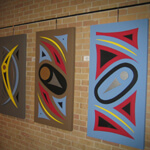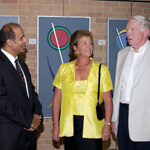
The public is invited to view the exhibit, “Asymmetric Symmetry: The Artwork of Stewart Reuter,” through Oct. 28 in the auditorium foyer. Dr. Reuter was professor and chairman of the department of radiology at the Health Science Center from 1980 to 2001 and now is professor emeritus.
Dr. Reuter’s exhibition is the second event in “The Arts in The Art of Medicine” Series from the Center for Medical Humanities and Ethics at the Health Science Center. Dr. Reuter and his wife, Marianne, are outstanding supporters of the center, including the donation of a $100,000 endowed professorship in 2004.
At a reception for Dr. and Mrs. Reuter, Health Science Center President Francisco G. Cigarroa, M.D., and Abraham Verghese, M.D., D.Sc. (Hon.), professor and director of the Center for Medical Humanities and Ethics, celebrated the accomplishments of Dr. Reuter, whose three-dimensional works of art were inspired by visiting museums around the world with his wife.

Dr. Reuter said the establishment of the Center for Medical Humanities and Ethics “is one of the most important events that has happened to the Health Science Center.” He praised the selection of Dr. Verghese as director.
Dr. Verghese, an internist and widely published author, occupies the Dr. Joaquin G. Cigarroa, Jr. Distinguished Chair in Medicine at the Health Science Center. He also is the Marvin Forland, M.D., Distinguished Professor in Medical Ethics.
Dr. Reuter said his artistic inspiration is 37 years of marriage to Marianne, who has a degree in museum management. The Reuters have traveled to many museums and seen every style and artist.
“I’ve always enjoyed working with wood,” he said. “We were given a 3-D plywood work by Barbara Stanczak, and I thought about painting plywood rather than canvass. With all the glue and paint, a lot of time you’re sitting around waiting for something to dry.”
Individuals may inquire about purchasing the art, which is a collection of 2-foot-by-4-foot constructions on wood. Proceeds will benefit the Center for Medical Humanities and Ethics.
The collection includes six original works called Koan 1 through 6. Dr. Reuter said Koan refers to a relatively insoluble riddle that Buddhist monks use to train their minds.

